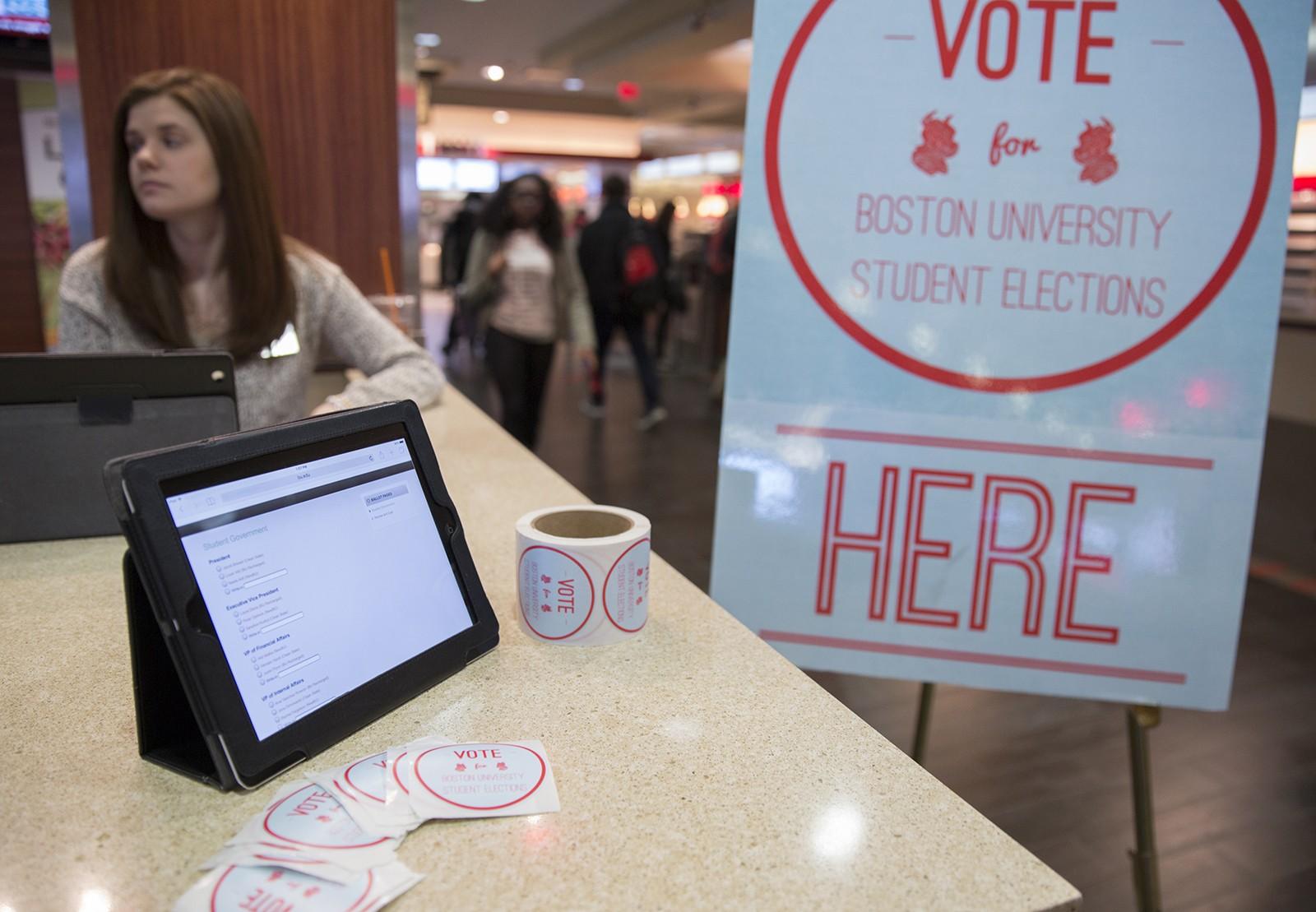
The most prominent theme in deliberating our endorsement for this year’s Boston University Student Government Executive Board election was balance — balance between student interests and administrative diplomacy, between lofty goals and realistic planning and between student involvement and student demands.
All three SG slates — BU Recharged, Clean Slate and NewBU — share the common goal of engaging with and representing the student body in a more direct manner. But with us, the slate that exemplifies the previously stated ideals most effectively is BU Recharged.
Made up of Louis Vitti, a junior in the Questrom School of Business, for president; Laura Davis, a sophomore in the College of Communication, for executive vice president; Anai Sanchez Riveron, a junior in COM, for VP of internal affairs; and Justin Flynn, a junior in Questrom, for VP of finance, BU Recharged is the SG slate that can most effectively balance performance with passion.
The entire slate is amiable and approachable to BU students, and we can see how this would likely reflect its relationship with the administration as well. BU Recharged’s members acknowledge that representing student interests also means being able to respectfully engage with the administration.
Both Vitti and Flynn’s prior experiences in SG as judicial commissioners show that they understand the possibilities and limitations of SG itself. But that’s not to leave out Davis and Riveron, whose previous leadership experiences with the Panhellenic Council and the West Campus Residence Hall Council, respectively, give them fresh perspectives on SG while still bolstering their leadership skills.
Of course, NewBU and Clean Slate run very tight campaigns with distinct appeal as well.
The most magnetic aspect of Clean Slate, specifically, is its passion for magnifying the student body’s voice and its dedication to standing its ground in front of the administration in the name of student interests. Its dedication to igniting student activism is undeniable, but there is a point when students and administration come to a standstill in which neither group is willing to back down. And that political stagnation won’t get the student body far.
Though admirable, some of Clean Slate’s policies are too idealistic as well. Collaborating with the City of Boston on regulating rent sounds incredible in theory but difficult to execute in practice. And though the slate is founded upon the student voice, there are dozens of student groups on campus that demand representation. There’s the feeling that Clean Slate is listening to those with the loudest and most radical platforms at the expense of other, less politically active students groups.
Like Clean Slate, NewBU was built on goals, goals and more goals. Its campaign is utilitarian and academically oriented. NewBU’s members know they want to leave a legacy behind, but not exactly the best way to go about it.
Some of NewBU’s proposals, such as placing on-call medical professionals in each dormitory and addressing grade deflation, are great in theory. But the proposals would logistically have a difficult time actually being implemented.
NewBU’s platform is built on diversity. Though its slate is made up of students from all backgrounds, its appeal is very niche. Its campaign is catered toward the more career-oriented BU students and academic types. Expanding 3-D printing and opening a coffee shop in the Photonics Center are goals angled to a specific group of people that doesn’t necessarily represent all of the university.
In this regard, BU Recharged is the strongest slate. It is both focused on increasing representation in SG for student groups with the smallest voices, and it has the most realistically achievable goals out of all three slates.
Even in campaigning, BU Recharged has proven that it can communicate with professional businesses in a respectful and effective manner. The slate has already partnered with Favor and GoPuff to appeal to prospective voters. That’s already a testament to the group’s communication skills and ambition.
That being said, BU Recharged’s endeavor to look outside of BU was one thing that raised the eyebrows of our editorial board. To us, Student Government represents an entity that primarily serves the students and those involved within the BU community. As much as we appreciate community outreach and applaud the slate for looking to help others, we feel that there are other resources on campus better suited to do this job.
However, the BU Recharged’s understanding of how to approach students and the administration proves to be an asset that was missing from the other slates. Vitti’s enthusiasm for more well-rounded representation was highlighted in his comprehensive answers and clearly outlined goals. Flynn shows a deep dedication to compromising with both students and the Allocations Board in terms of budgeting and funding.
BU Recharged is also the only slate that truly acknowledges that SG needs to learn how to work together and collect itself before any major project can be accomplished. In a significant portion of its platform, the slate specifically laid out that it would improve multicultural representation on campus by establishing a Multicultural Committee to advocate for diverse student interests in SG.
As the most charismatic slate running this election, there is no doubt the slate will use its easy access to the administration to represent the most students in the most effective way possible.
BU Recharged is ready to take on the SG balancing act.